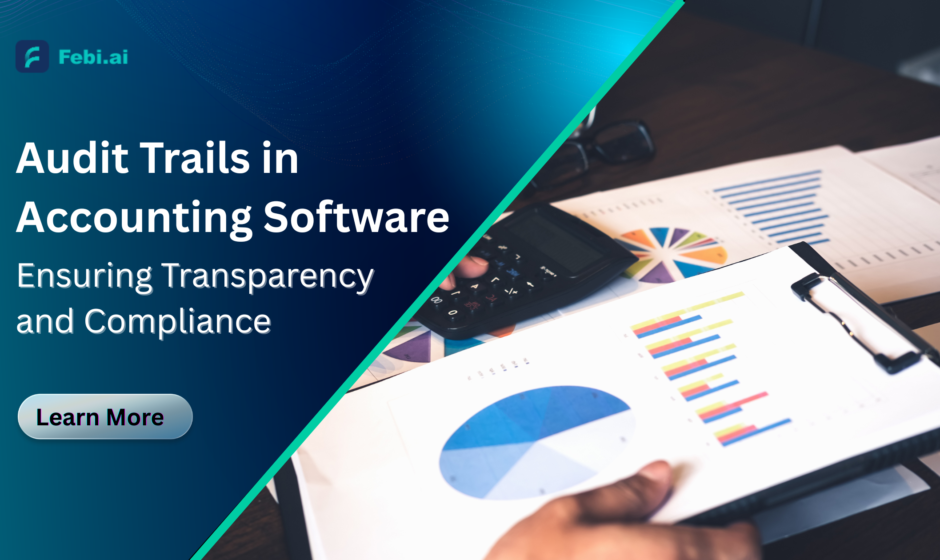In the modern business world, transparency and compliance have become critical pillars for building trust and ensuring financial integrity. With increased regulatory requirements and the growing need for accurate financial reporting, businesses must adopt reliable mechanisms to monitor and document their financial activities. One such essential tool is an audit trail, especially when integrated into accounting software.
This article explores the concept of audit trails in accounting software, their benefits, and how they help organizations maintain transparency and regulatory compliance.
What is an Audit Trail in Accounting Software?
An audit trail is a chronological record that provides documentary evidence of the sequence of activities affecting a specific operation, transaction, or event within a system. In accounting software, audit trails capture detailed information about:
-
Financial transactions
-
Data entries, edits, and deletions
-
User actions and system processes
-
Changes in master data or account setups
Essentially, an audit trail allows businesses to track every change or transaction from its initiation to its final state, providing a transparent record that can be reviewed, verified, and audited when necessary.
Key Components of an Effective Audit Trail
A comprehensive audit trail in accounting software should capture the following details:
-
Date and Time Stamp: When was the action performed?
-
User Identification: Who performed the action?
-
Description of Action: What action was performed (e.g., create, modify, delete)?
-
Affected Data or Records: Which transactions, fields, or reports were affected?
-
Previous and New Values: What were the values before and after the change?
This information is critical for internal reviews, audits, error detection, and investigations in case of discrepancies or fraud.
Why Audit Trails Matter for Businesses
1. Enhancing Financial Transparency
An audit trail brings visibility to all financial operations by recording every transaction and modification within the system. This transparency fosters accountability among employees and reduces the likelihood of unauthorized or fraudulent activities.
2. Ensuring Regulatory Compliance
Regulatory bodies across the globe mandate strict financial reporting and data integrity requirements. Whether it’s GST laws in India, Sarbanes-Oxley (SOX) compliance in the US, or IFRS standards internationally, audit trails help demonstrate that businesses maintain accurate, tamper-proof records, thereby supporting compliance.
3. Facilitating Internal and External Audits
During internal reviews or external audits, having a detailed audit trail simplifies the verification process. Auditors can quickly trace the origin of transactions, review modifications, and ensure financial data aligns with regulatory requirements, reducing the chances of penalties or legal consequences.
4. Detecting and Preventing Fraud
By tracking all user actions and data changes, audit trails act as an early warning system for potential fraud. Suspicious activities such as unauthorized access, unusual transactions, or data tampering can be detected promptly, enabling corrective action before significant damage occurs.
5. Improving Operational Efficiency
Audit trails help identify process gaps, system inefficiencies, or human errors that may affect financial operations. With this insight, businesses can streamline processes, improve system controls, and minimize the risk of costly mistakes.
Audit Trails and Modern Accounting Software
Modern accounting software solutions come equipped with built-in audit trail features that automate tracking and reporting of all system activities. Here’s how they contribute to business efficiency:
1. Real-Time Monitoring
Automated audit trails provide real-time insights into financial transactions and user activities, enabling businesses to address issues as they arise rather than during post-incident reviews.
2. Role-Based Access Control
Accounting software integrates audit trails with user permission settings, ensuring that only authorized personnel can perform sensitive actions. Every action is recorded, and unauthorized attempts are flagged for review.
3. Tamper-Proof Records
Advanced software solutions use encryption and secure databases to protect audit trail data from manipulation. This integrity ensures the records remain reliable for legal or regulatory scrutiny.
4. Comprehensive Reporting
Most accounting platforms generate detailed audit trail reports that can be customized by date, user, transaction type, or other filters. These reports assist in audits, management reviews, and compliance documentation.
Industries That Benefit from Audit Trails
While audit trails are crucial for all businesses, certain industries place a higher emphasis on them due to stricter compliance and higher fraud risks:
-
Financial Services: To meet regulatory standards and protect against financial crimes.
-
Healthcare: For safeguarding patient data and meeting data privacy regulations.
-
Retail and E-Commerce: To manage large transaction volumes and prevent fraud.
-
Manufacturing: To track production costs, inventory changes, and supply chain transactions.
-
Government and Non-Profit: To maintain accountability in fund management and public reporting.
Best Practices for Implementing Audit Trails
To maximize the benefits of audit trails, businesses should adopt the following best practices:
1. Choose Reliable Accounting Software
Select accounting software that offers robust, automated audit trail capabilities. Ensure it complies with relevant industry standards and data protection requirements.
2. Maintain Data Security
Audit trail data should be stored securely, with regular backups and restricted access to prevent unauthorized alterations or data loss.
3. Regularly Review and Analyze Audit Trails
Set up periodic reviews of audit trail reports to detect anomalies, identify improvement areas, and ensure system integrity.
4. Train Employees on Accountability
Educate staff on the importance of audit trails, emphasizing their role in ensuring transparency, preventing errors, and maintaining trust within the organization.
5. Stay Updated with Compliance Requirements
Regulations evolve over time. Businesses must stay informed about changes in financial reporting and audit trail requirements to avoid non-compliance.
Challenges in Managing Audit Trails
While audit trails are essential, businesses may face certain challenges:
-
Managing large volumes of audit data
-
Ensuring consistent audit trail configuration across multiple systems
-
Balancing system performance with continuous monitoring
-
Interpreting complex audit logs during investigations
Partnering with qualified IT and accounting professionals can help mitigate these challenges and ensure effective audit trail management.
Conclusion
Audit trails in accounting software are indispensable tools for fostering financial transparency, ensuring regulatory compliance, and safeguarding businesses against errors and fraud. By leveraging modern, automated audit trail solutions, organizations can maintain accurate, tamper-proof records while enhancing operational efficiency and building stakeholder trust.
In today’s competitive and regulated environment, audit trails are not merely a technical feature—they are a strategic necessity for sustainable, compliant, and transparent business operations.



